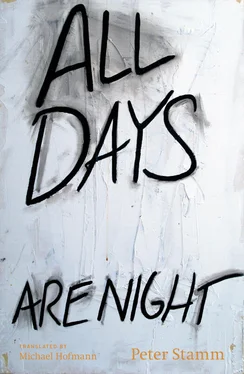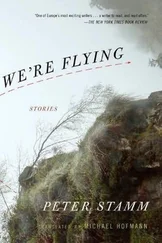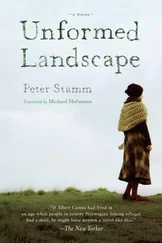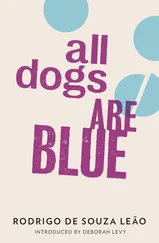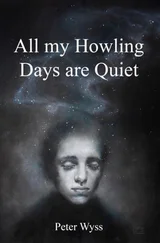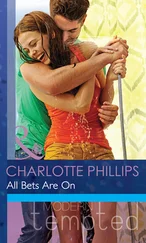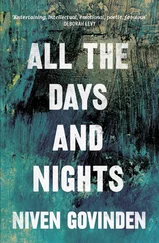Peter Stamm - All Days Are Night
Здесь есть возможность читать онлайн «Peter Stamm - All Days Are Night» весь текст электронной книги совершенно бесплатно (целиком полную версию без сокращений). В некоторых случаях можно слушать аудио, скачать через торрент в формате fb2 и присутствует краткое содержание. Год выпуска: 2014, Издательство: Other Press, Жанр: Современная проза, на английском языке. Описание произведения, (предисловие) а так же отзывы посетителей доступны на портале библиотеки ЛибКат.
- Название:All Days Are Night
- Автор:
- Издательство:Other Press
- Жанр:
- Год:2014
- ISBN:нет данных
- Рейтинг книги:3 / 5. Голосов: 1
-
Избранное:Добавить в избранное
- Отзывы:
-
Ваша оценка:
- 60
- 1
- 2
- 3
- 4
- 5
All Days Are Night: краткое содержание, описание и аннотация
Предлагаем к чтению аннотацию, описание, краткое содержание или предисловие (зависит от того, что написал сам автор книги «All Days Are Night»). Если вы не нашли необходимую информацию о книге — напишите в комментариях, мы постараемся отыскать её.
All Days Are Night — читать онлайн бесплатно полную книгу (весь текст) целиком
Ниже представлен текст книги, разбитый по страницам. Система сохранения места последней прочитанной страницы, позволяет с удобством читать онлайн бесплатно книгу «All Days Are Night», без необходимости каждый раз заново искать на чём Вы остановились. Поставьте закладку, и сможете в любой момент перейти на страницу, на которой закончили чтение.
Интервал:
Закладка:
Chapter 2
Never will I succeed in putting as much strength in a portrait as there is in a head. The mere fact of living demands such willpower and energy …
ALBERTO GIACOMETTIDust was time in material form, Hubert could no longer remember who had said it, or where he had read it. At any rate, a lot of time seemed to have collected in his studio, because there was a thin, almost transparent layer of dust over everything. He didn’t bother to wipe it away, he had only come to take a look through his old stuff and see if there was anything he could use. The big nudes, the naked housewife series, as his gallerist called them, he didn’t even look at, they had become so strange to him, it was as though they were by someone else. He took a stack of large folders from a shelf and opened them one after the other, industrial landscapes, pencil drawings of machinery, portraits, and nudes, the oldest things dated back to his student days. After briefly hesitating, he took down a folder labeled Astrid . It contained two dozen photographs and a few sketches. He had done them right at the beginning of their relationship, during a summer holiday in the south of France. They had driven around, staying in campsites. In every picture there was Astrid naked in a different landscape, sometimes so small that she could hardly be made out. He had thought of drawing the whole series in crayon but only finished a very few. In his memory they had been better than they were. He put them all back in the folder and went on to the next one.
An hour later, Hubert was back outside the building. He had managed to find nothing usable, but carted the slides and projector into his car anyway, raw material that sometime might come in handy. It was midnight, but the air was balmy.
He had been teaching at the art school for six years now. There were two weeks left of the semester, but he was already finished, and he felt that strange mix of freedom and what now? that he was caught up in every summer.
He had lit a cigarette and rolled the window down. There were still plenty of people around, in the distance he heard a police siren. All month, the weather had been unusually warm and dry. First, Hubert had been pleased about it, then the longer it went on, the more it disquieted him. The news carried reports of desiccated crops, and everyone was talking about climate change, but that wasn’t the cause of his disquiet. When he drove over the bridge, he saw the lakeside lights flashing a storm warning.
The next morning a light rain was falling. Hubert had opened the window, and a cool wind blew in his face. He had gotten up early and prepared the apartment for a few months without him. On the car radio he listened to the weather forecast. It seemed the next few days would remain cold and rainy, and the snow line would fall below a thousand meters.
He got caught up in the rush-hour traffic. He wasn’t a very experienced driver, and when he abruptly changed lanes, or got moving too late after the lights turned, the cars behind him honked. On the Autobahn other cars sat on his tail. After two hours, just before he exited the Autobahn, he stopped at a rest site and drank a cup of coffee. In the restaurant there were some pictures by a painter who had made a name for himself depicting elephants and tigers. A little leaflet was provided, which listed the absurdly high prices that were charged for the works. Hubert was almost physically disgusted by the paintings, and he soon set off.
Driving on, he briefly entertained the thought of making a living like that artist. Since he’d begun teaching, he hardly got around to painting anymore. He persuaded himself that it was because he was pushed for time. In his younger days, he always used to mock artists who feathered their nests as professors, but following Lukas’s birth he accepted an offer from the college. A regular job seemed to be the only way of having a reasonably comfortable middle-class life and not ending up as an impoverished artist in the gutter.
When Lukas started kindergarten, Astrid went back to work in the property department of the same bank where she had worked before. They moved into the town next door, where they managed to buy a small house on the edge of the fields.
As well as her work, Astrid pursued her interest in energy and the body. Hubert wasn’t impressed by the esoteric life-help scene she started to move in. He passed occasional ironic remarks, to which she reacted so violently that he didn’t say anything the next time she registered for a weekend course in psychodrama or breathing therapy.
After a short while, she began to offer special coaching for entrepreneurs. She converted their basement into a sort of treatment room. On the walls she hung pictures by an Italian woman artist Hubert knew. The multiply exposed cityscapes through which anonymous individuals moved had always struck him as being on the cool side, but Astrid said no, they were perfect for her clientele. On a little corner table she put a rose quartz. She got a flyer printed up, full of executives and problem awareness, resources and parameters, and before long the first clients arrived, usually big shots from her bank, and disappeared downstairs with her.
When I have a large enough customer base I mean to go full-time, said Astrid over dinner.
She got terribly angry when Hubert said the only reason her bosses came to her for coaching was that she was so good-looking. Or is it an accident that you always seem to be in short skirts for your sessions?
You need to think about your own life-work balance, she countered. It would be a start if you weren’t always mowing the lawn when I have clients.
In objective terms, they were doing very well, but Hubert felt increasingly like an impostor when he stood in front of his students and critiqued their work. He always had something big planned for the holidays and then kept putting it off, doing odd jobs about the house and garden or busying himself with vague research for projects that were never realized. He read a lot, and he saw colleagues. He still kept his studio in the old textile mill, but he rarely went there anymore. At first he had supposed his difficulties marked the beginning of a new productive phase. He put off his gallerist month after month. And he in turn asked less and less about what Hubert was working on now and instead sent him photos of the dog he had acquired and invitations to the openings of other artists in his stable. Hubert took a quick look at the postcards and laid them aside with a mixture of envy and irritation at the ardor with which his colleagues pursued their humdrum ideas.
Then one day he got an e-mail from Arno, the head of a cultural center in the mountains where he had had his first and only large solo exhibition seven years before. To him it all seemed incredibly remote, and he had no significant memory of the place, the rooms or the people there, but this Arno guy still seemed to be full of their meeting. He addressed him by his first name, wrote enthusiastically about that show, and invited Hubert to come back. He gave him a budget and carte blanche, he could stay in the cultural center as long as he wanted, only the date for the exhibition was set, the end of June next year. Hubert felt like turning it down immediately, but then he printed out the e-mail and left it with a pile of other stuff in his in-box.
After dinner, he told Astrid about the invitation from Arno. That was a nice time, she said, do you remember? I helped you hang the paintings. I was pregnant then. We had this little room right at the top of the building with a creaky bed. Arno once made some remark about it, but you weren’t bothered. She smiled quickly, then her face took on an expression as though she was confused by what she remembered. Could be, said Hubert, who could remember nothing of all this.
Читать дальшеИнтервал:
Закладка:
Похожие книги на «All Days Are Night»
Представляем Вашему вниманию похожие книги на «All Days Are Night» списком для выбора. Мы отобрали схожую по названию и смыслу литературу в надежде предоставить читателям больше вариантов отыскать новые, интересные, ещё непрочитанные произведения.
Обсуждение, отзывы о книге «All Days Are Night» и просто собственные мнения читателей. Оставьте ваши комментарии, напишите, что Вы думаете о произведении, его смысле или главных героях. Укажите что конкретно понравилось, а что нет, и почему Вы так считаете.
